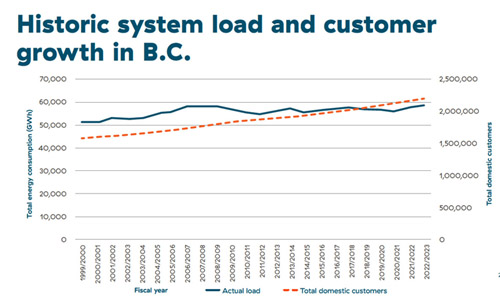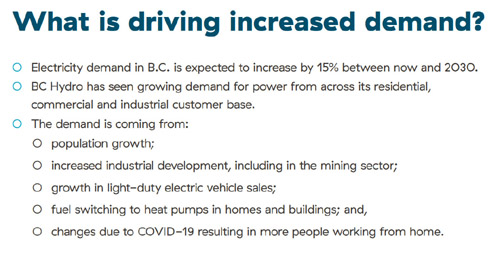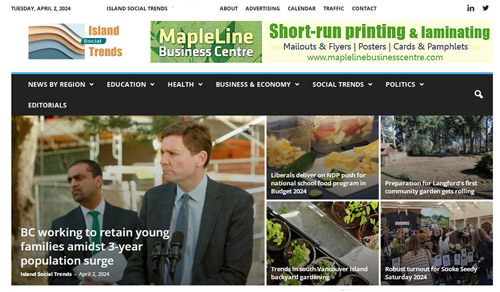Wednesday April 3, 2024 | VICTORIA, BC [Updated April 4, 2024]
by Mary P Brooke | Island Social Trends at the Legislature today
Chris O’Riley, President and CEO of BC Hydro, today said at that historic system load and customer growth in BC necessitates an increase in electricity generation.
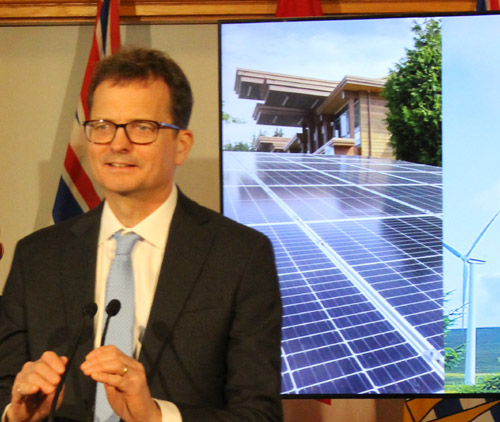
He made a joint announcement about a competitive call for power, held at the BC Legislature today along with join Josie Osborne, Minister of Energy, Mines and Low Carbon Innovation.
An integrated resource plan (IRP) includes:
- 20-year planning horizon
- Flexible plan that considers a range of scenarios (demand and supply) and allows BC Hydro to adjust based on changing conditions
- Annual needs and peak use
- Planning criteria in the Clean Energy Act: BC Energy Objectives; Clean or renewable resources; Self-sufficiency requirement based on average water flows.
- Government restored BCUC oversight of long-term energy planning in 2019
- BC Hydro’s updated IRP was approved by the BCUC in March (first time since 2006)
Electricity demand is expected to increase by 15% by 2030. Growing power demand is seen across residential, commercial and industrial.
Increased demand:
Demands is from population growth, but also increased industrial development including mining. There is growth in light-duty electric vehicle sales.
BC Hydro notes that people are switching to heat pumps in homes and buildings.
There also seems to be an idea that due to COVID-19 there is more energy usage with people working from home. But O’Reilly pointed out today that as more new homes are smaller in size that overall use of electricity by households is not really going up that much.
Generating enough electricity:
Site C is expected to achieve first power by the end of 2024 and be fully complete in 2025, which will add 8% to BC Hydro’s current supply.
Option time of use rates are being considered. Energy purchase agreements with existing IPPs will be done on a cost-effective basis. There is an idea to advance the integration of utility-scale batteries.
Solar in summer:
As summers become warmer there is increasing electricity demand for air cooling.
Some of the upcoming Independent Power Producer (IPP) contract might be focused on use of solar to generate electricity. BC Hydro’s CEO says that households with solar panels might also help reduce demand on the grid.
Minister of Energy, Mines and Low Carbon Innovation:
Josie Osborne, Minister of Energy, Mines and Low Carbon Innovation, addressed media yesterday with enthusiasm about the call for more IPP’s. She called it “another important step to continue to build a clean economy”. She also highlighted the creation of “good sustainable jobs for people”.
The announcement was about “generating more clean, reliable and affordable electricity that BC needs to power a future and reduce pollution,” said Osborne. “People and businesses are with us on this journey,” said Osborne with regard to climate change and energy conservation (mentioning EV’s and heat pumps in that context).
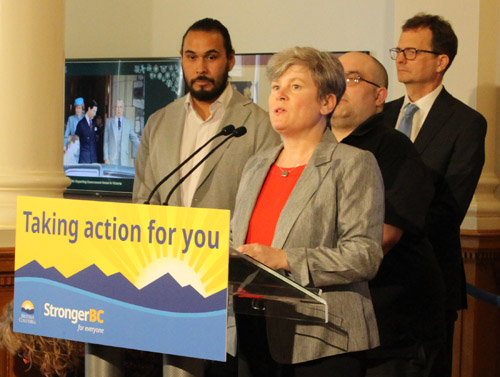
She said there is “unprecendented future demand” for electricity and mining for critical minerals that are needed in the new economy.
Osborne says bringing solar and wind technology for generating electricity has come down in cost over the years.
She sees the overall power-producing capacity of BC Hydro being “more resilient in the years to come”.
BC Greens statement:
The BC Greens were pleased with the news of bringing more power into the electrical grid.
“Climate change is here – wildfires, heat waves, flooding, and droughts hit our province year after year. With record low snowpack levels, concerns about drought and the ability to generate hydropower are heightened. It’s clear we need to act fast to diversify our electricity system and stay competitive in the clean energy economy. This call is a critical first step, and I am happy to see this government take it,” said BC Green Leader Sonia Furstenau in a statement.


